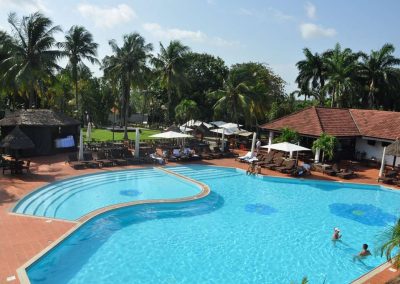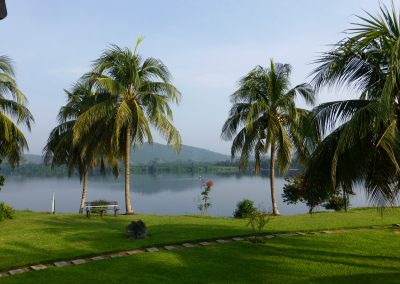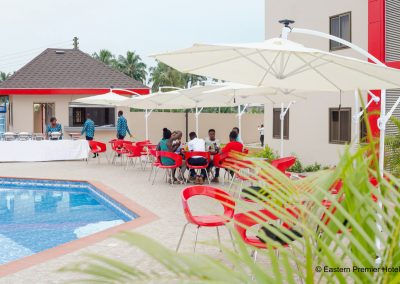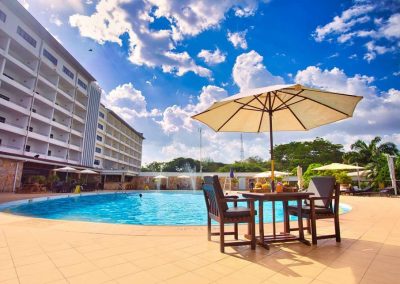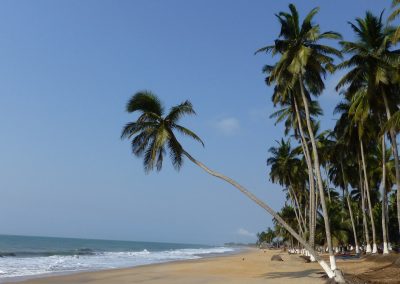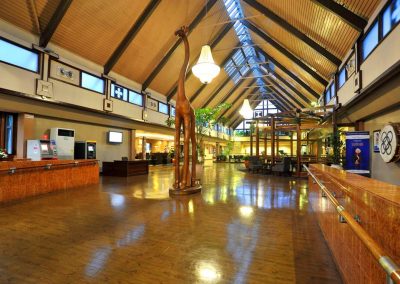Ghana
Country
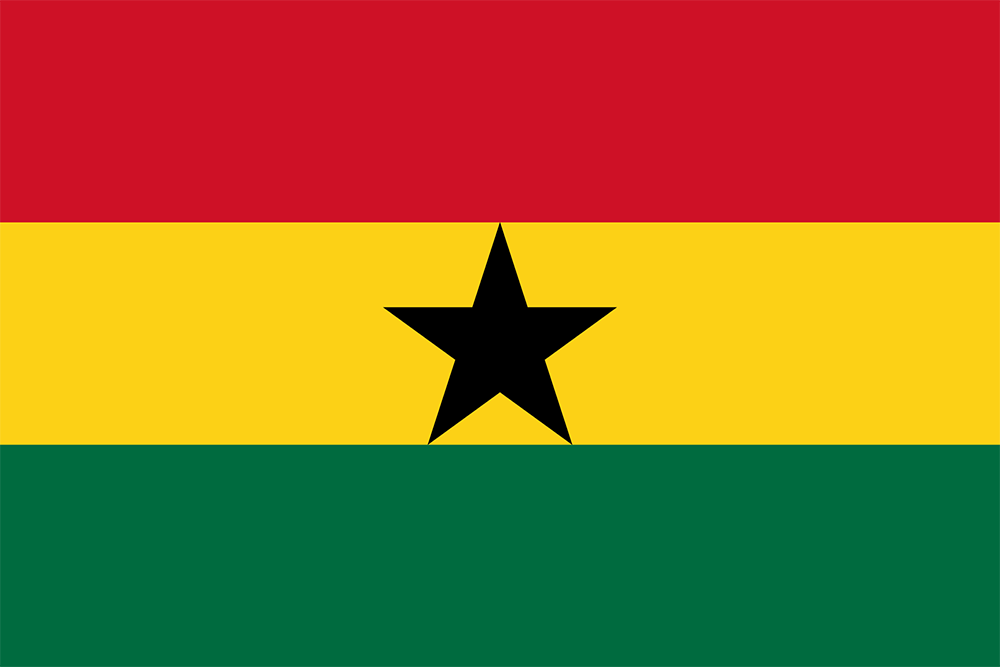
| Political status: | Peaceful Republic | Birth rate: | 2,5% |
| President: | Nana Akufo-Addo | Life expectancy: | 64 years |
| Surface: | 238.537 km² | Infant mortality: | 47/1000 births |
| Language: | English | Doctor/patient ratio: | 1:13.000 |
| Population: | 32 million | HIV prevalence: | 1.7% |
Itinerary
- Accra
- Akosombo
- Koforidua
- New Tafo
- Agogo
- Kumasi
- New Adubiasi
- Brenu
- Elmina
- Kakum National Park
- Cape Coast
- Accra
The participants travel in an air-conditioned bus with an experienced English speaking driver on tarmac roads (approx. 1000 km).
Curriculum
Schistosomiasis, lymphatic filariasis, onchocerciasis, cutaneous larva migrans, malaria, amoebiasis, shigellosis, typhoid fever, Buruli ulcer, leprosy, Dengue fever, Chikungunya fever, West Nile fever and other arboviral infections, HIV/AIDS and related opportunistic infections, DD of fever and diarrhoea in the tropics, medical botany, traditional medicine, laboratory diagnosis of tropical infectious diseases.
| Teaching | CME Hours |
|---|---|
| Ward rounds and case presentations | 20 |
| Field excursions | 15 |
| Laboratory manuals | 10 |
| Lectures and round-table discussions | 15 |
| Total CME Hours | 60 |
Program sequence (click every single day)
Day 1
| Transfer from Kotoka International Airport (Accra) to the Lancaster Hotel, Accra (5 km) | |
| 23.00 | Briefing on the TROPMEDEX excursion (Dr. Schaefer) Meeting point: reception of the Lancaster Hotel |
Day 2
| 09.00-10.00 | Lecture: Update on schistosomiasis (Dr. Schaefer) |
| Drive to Big Ada in the Volta region (80 km) | |
| 12.00-15.00 | Rounds: Big Ada hospital: focus on Malaria, AIDS and worm infections (Dr. Narh) |
| 15.30-17.30 | Laboratory manuals: Diagnosis of schistosomiasis and other worm infections (Dr. Agbeko) |
| Drive to Akosombo (120 km) |
Day 3
| 08.00-10.00 | Lecture: Update on malaria (Dr. Schaefer) |
| 10.30-11.30 | Lecture: Update on Ebola (Dr. Akamah) |
| 12.00-16.00 | Rounds in Akosombo Regional Hospital. Focus on tropical infectious diseases (Dr. Debrah und Dr. Boatin) |
| 16.30-18.30 | Field excursion: Prevention and control of schistosomiasis in fishing villages near Akosombo: boat trip on Volta river. (Dr. Schaefer and Dr. John) |
Day 4
| 10.00-12.00 | Lecture: Update on Dengue and Chikungunya fever (Dr. Schaefer) |
| Drive to Aburi (80 km) | |
| 15.00-17.00 | Field excursion in the Aburi Botanical Garden. Artemisia annua and other plants used in the treatment of malaria (Dr. Felix) |
| Drive to Koforidua (50 km) |
Day 5
| Drive to New Tafo (20 km) | |
| Visit to the Cacao Research Institute of Ghana (Mr. Lloyd) | |
| Drive to the Presbyterian Hospital in Agogo (120 km) | |
| 12.00-13.00 | Lecture: Update on Buruli ulcer (Dr. Abass, WHO) |
| 14.00-17.00 | Rounds in Agogo Hospital. Buruli ulcer and other tropical dermatological manifestations (Dr. Abass) |
| 17.15-19.15 | Laboratory manuals: diagnosis of dermatological manifestations (Dr. George) |
| Drive to Kumasi (90 km) |
Day 6
| 08.30-09.30 | Lecture: Update on cholera (Dr. Schaefer) |
| 10.00-13.00 | Field excursion: prevention and control of cholera in the biggest market in Ghana (Dr. Peter and Dr. Schaefer) |
| 15.00-18.00 | Rounds: patients with tropical infectious diseases and dermatological manifestations at Komfo Anokye Teaching Hospital, Kumasi (Prof. Michel ID expert & dermatologist) |
Day 7
| 08.00-09.00 | Lecture: Update on onchocerciasis (Dr. Schaefer) |
| Drive to New Adubiase (100 km) | |
| 11.00-13.00 | Field excursion: prevention and control of onchocerciasis in New Adubiase area (Dr. Williams) |
| Drive to Brenu (100 km) |
Day 8
| 08.30-09.30 | Lecture: DD of fever in the tropics (Dr. Schaefer) |
| 10.00-11.00 | Lecture: update on lymphatic filariasis (Dr. Schaefer) |
| 12.00-15.00 | Field excursion: presentation of lymphatic filariasis patients in Brenu area (Dr. Boger) |
| Drive to Cape Coast (20 km) | |
| Visit of the slave museum in Cape Coast Castle (Mr. Blankston) | |
| Drive to Brenu (20 km) |
Day 9
| 09.15-10.15 | Lecture: update on African snakes (Dr. Schaefer) |
| 10.15-12.15 | Lecture: update on leprosy (Dr. Schaefer) |
| Drive to Ankaful Leprosy Hospital (20 km) | |
| 13.00-16.00 | Rounds: Leprosy and other dermatological manifestations, Ankaful Leprosy Hospital (Dr. Otabil & Dr. Okoe) |
| Drive to Kakum National Park (30 km) | |
| 16.45-18.45 | Field excursion: medical botany in Kakum National Park (Dr. Adungu and Dr. Asante) |
| Drive to Brenu (40 km) |
Day 10
| 07.00-09.00 | Lecture: Update on diarrhoea (Dr. Schaefer) |
| Drive to Cape Coast (20 km) | |
| 09.30-13.30 | Rounds: Acute abdomen in typhoid fever and other infectious diseases, Surgery, Cape Coast Teaching Hospital (Dr. Morna) |
| 14.00-16.00 | Laboratory manuals: Diagnosis of tropical infectious diseases, Oak Tree Medical Services Laboratory, Cape Coast (Dr. Morna) |
| Drive to Accra (150 km) |
Day 11
| 08.00-12.00 | Laboratory manuals: performance of the thin and thick blood film for the diagnosis of malaria, Lancet Laboratories, Accra (Dr. Paul) |
| 13.00-14.00 | Excursion to the Regional Medical Officer for West Africa, Embassy of Germany, Accra (Dr. Besch) |
| Transfer to Kotoka International Airport, Accra | |
| Changes may occur without prior notice |
Accommodation
Night 1: Lancaster Hotel, Accra
Night 2-3: Afrikiko River Front Resort, Akosombo
Night 4: Eastern Premier Hotel,
Koforidua
Night 5-6: Lancaster Hotel, Kumasi
Night 7-9: Brenu Beach Resort, Brenu
Night 10: Lancaster Hotel, Accra
Travel preparation
Health
You should be in good health and fit.
Vaccinations: You need to be vaccinated against yellow fever. Custom officials check upon arrival your yellow vaccination booklet. It is highly recommended to be vaccinated againt polio, diphtheria, tetanus, typhoid and hepatitis A and to take malaria prophylaxis (malarone or doxycycline). Check wwwnc.cdc.gov/travel/destinations/traveler/none/ghana.
Carry essential medicine with you, and if you like, bring masks, syringes, gloves etc., which are always in need in hospitals! If asked at the customs on arrival, explain that the medicines are for “private use“.
Tourist Visa
Luggage
| light trousers | hand sanitizer |
| jeans | mouth-nose-mask |
| shorts/skirt | mosquito repellent |
| shirts | sun cream |
| t-shirts | flashlight |
| light sweater | alarm clock |
| light impermeable wind jacket | universal travel adapter |
| comfortable sport shoes with proper soles | light rucksack |
| slippers | bathing suit |
| sunglasses | small umbrella |
| hat |
Luggage should be packed in a soft, lockable travel bag (no bulky suitcase). Maximum luggage weight is 15 kg per person. You don’t need a mosquito net, white coat or stethoscope.
Medical literature
Oxford Handbook of Tropical Medicine, Robert Davidson et al., Oxford University Press, 5th Edition, December 2021, ISBN: 0198810857.
Travel guide
Laundry
Money
Insurance
Internet, Mobile phone
Airlines to Accra, Ghana
- from Europe to Accra (ACC): Turkish Airlines, KLM, British Airways, TAP, BrusselsAir
- from Asia/Australia to Accra: Emirates, Qatar Airways
- from USA/Canada to Accra: Delta (direct via New York)
Airport transfer
A free airport shuttle is provided from the airport to Lancaster Hotel in Accra. The driver from the hotel will wait for you in the arrival hall of the airport building holding a blackboard with your name. The transfer takes about 30minutes, depending on the traffic.

